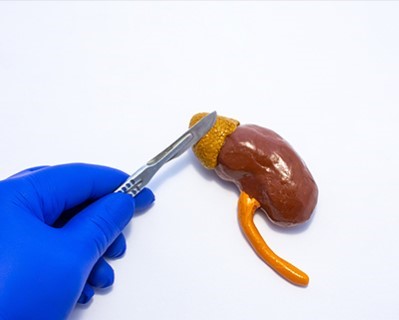Adrenalectomy
- Purpose: Removes one or both adrenal glands to treat tumors or adrenal gland disorders.
- Procedure: The adrenal glands are surgically removed through an incision in the abdomen.
-
Note: The information provided here applies to routine Adrenalectomy procedures under standard conditions. However, specifics may vary depending on individual patient factors, such as the underlying condition being treated (e.g., adrenal tumors, Cushing's syndrome, or pheochromocytoma), patient tolerance, or any complications that might arise during or after the procedure. The patient’s overall health and the complexity of the surgery can also influence the recovery process.
Inpatient/Outpatient
Adrenalectomy is typically performed as an inpatient procedure, requiring a hospital stay for close monitoring and initial recovery. The length of stay depends on the complexity of the surgery and the patient’s overall condition.Hospital Stay Duration
Patients undergoing adrenalectomy usually stay in the hospital for 2 to 5 days, depending on the complexity of the surgery and the patient’s recovery progress. Longer stays may be necessary if complications arise or if the patient requires more intensive post-operative care.Type of Anesthesia
Adrenalectomy is performed under general anesthesia, meaning the patient will be fully unconscious during the surgery.Travel After Procedure
Patients are generally advised to avoid travel, particularly long-distance or air travel, for at least 2 to 4 weeks after the procedure. This allows time for initial recovery and monitoring for potential complications, such as infection or hormonal imbalances.Pre-procedure Preparation
Preparation for adrenalectomy involves following specific guidelines provided by the healthcare provider. This may include fasting before surgery, adjusting certain medications, and undergoing pre-operative tests such as blood work, imaging studies, and possibly an evaluation by an endocrinologist. Patients with hormone-secreting tumors may need specific medical management to stabilize hormone levels before surgery.Procedure Duration
The adrenalectomy procedure typically takes about 2 to 4 hours, depending on whether a unilateral (one adrenal gland) or bilateral (both adrenal glands) adrenalectomy is being performed. The surgery can be done laparoscopically (minimally invasive) or through an open approach, depending on the size of the tumor and the surgeon’s assessment.Recovery Time
Recovery from adrenalectomy varies, with most patients needing several weeks to fully recover. Initial recovery in the hospital involves managing pain, monitoring hormone levels, and gradually reintroducing liquids and foods. Patients are advised to avoid strenuous activities, heavy lifting, and stress during the recovery period, as these can impact healing and hormone balance. Follow-up appointments are essential to monitor hormone levels, manage any complications, and adjust medication if needed.Estimated Cost
The cost of adrenalectomy can vary based on the surgeon's expertise, the complexity of the procedure, geographic location, and whether additional treatments, such as medication for hormone management, are required. For accurate cost information, patients should contact their healthcare provider or hospital directly.Post-procedure Care
Post-procedure care for adrenalectomy involves managing pain, preventing infection, and ensuring proper hormone balance. Patients will need regular follow-up appointments to monitor recovery and manage any complications, such as adrenal insufficiency or imbalances in electrolytes. Hormone replacement therapy may be necessary if both adrenal glands are removed. It is important to report any signs of complications, such as fatigue, dizziness, or changes in blood pressure, promptly.

